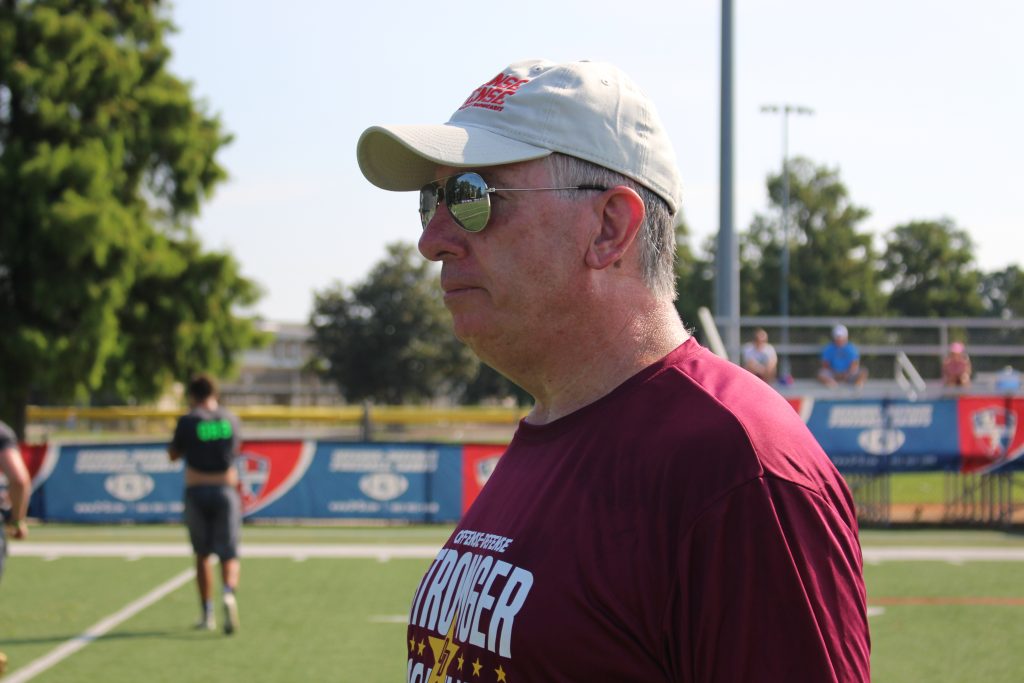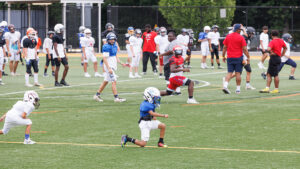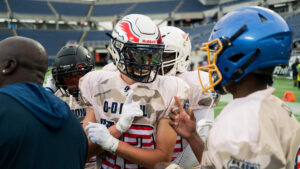The Line of Scrimmage Podcast is all about football! Tune in weekly to your host Coach Greg Quick to learn everything there is about the current state of football, history, top athletes, special guests and more on the all new podcast brought to by Offense-Defense Football.

ABOUT COACH QUICK
Greg Quick is currently the Canadian Football League Director, Global Scouting. GQ has nearly four decades on the sidelines including high school, university and professional football. He has sixteen years as a university head coach in addition to coordinating both sides of the ball and tutoring linebackers to quarterbacks and everything in between. Coach Quick began his relationship with O-D in 1986. Greg and his wife, Jeannie, have six children and two grandchildren.
ABOUT THIS EPISODE
The Line of Scrimmage, Episode 5 –Global Football, How football is growing internationally.
There is no doubt about it that that Americans and Canadians love their football. But the questions is, does the game penetrate other parts of the world? Join Coach Greg Quick as his navigates the globe in search of gridiron football’s growth and peoples general love of the game.
Speaker 2 (00:26):
Hello, this is the line of scrimmage where we go each week. One on one with the issues facing football today. Hello, I’m Greg quick and we’re powered by offense defense sports camps. This is episode five of our podcast. Today. We’re going to discuss the future of football, the future of Gridiron football without borders. I am sure author John Grisham was looking back to the future when he wrote playing for pizza in 2007, this tale follows the exploits of Rick Dockery, a fictitious quarterback in the NFL, a journeyman quarterback that bounced from team to team. And when given the opportunity to become a starter failed miserably, the only employment that his agent could find was with the Parma Panthers and the Italian league to make a long story short, Rick packed his bags and headed to Italy. The first few months were up and down, took a while to understand the language.
Speaker 2 (01:22):
It took a while to adapt to the culture. It took a while to gain the respect of his teammates and of his opponents. But at the end of those months, he had led his team to the Italian championship. John Grisham had the opportunity to visit with several players during his travels players that played in the Italian league. He was having dinner one evening, sharing a pizza and beers with a couple of young players. He was interested in knowing what the compensation for playing football in Italy was. So he asked, what do you get paid? And the two players started laughing uncontrollably and they laughed. It’s right in front of you. It’s right in front of you. John Grisham asked what’s right in front of me. I don’t understand what are you talking about? It’s right in front of me and a young one young man through his laughter said, we play for pizza. We play for the pizza and beer that are in front of us tonight from playing the day. Our compensation tonight is this pizza and beer we’re playing for pizza. And this was the inspiration for John’s book today in Italy, 70 teams with over 3000 players, the game of football continues to grow. It continues to expand at an unbelievable rate. The pandemic that we’re experiencing now has shown us how much this world has begun to shrink, but football is expanding and an ever increasing rate. Let me
Speaker 1 (02:45):
Share with you that there are over 80 countries
Speaker 2 (02:48):
World that played Gridiron football
Speaker 1 (02:50):
Over 80 countries in the world. There are over a quarter million
Speaker 2 (02:54):
International football players, a quarter million. Let me, let me give you this analogy. If I added all the players in great Britain in Germany, in France and Japan, if I total all the players in those four countries together, it’d be 150,000 players. That’s a significant number that gives you an idea of the extent, the breadth of football across the goal. What makes it even more significant is if I compare it against number of players in the NCAA, if I take all the players that FBS FCS division two and division three, they total 70,000 players compared to 150,000. There are twice as many football players in Japan, France, Germany, and great Britain. Then there is in the NCAA to me, that’s significant that shows you the rate of growth, the, how football is expanding across the globe. And I really believe that we’ll look back to this podcast.
Speaker 2 (03:55):
The same as we do to jive. Grisham’s book that we’re looking back at the future, that the future of football, the future of Gridiron football has no borders at 20 years from now. Don’t be in true global competition. The game of football will continue to expand. The standard of performance will increase across the globe. So that teams from Europe teams, from Africa teams, from Asia teams, from the Pacific teams, from central America, South America, North America, we’ll all play against each other. That’s how I see the game of football growing. The future of Gridiron football has no borders in Japan. Today. There are 17,000 players, 17,000 football players, 400 high schools, a hundred colleges, 53 teams in the excellent 17,000 players. If you go to the Japan bowl, which is the ex league, the premier league championship, there are 30,000 fans. If you go to the rice full of over 30,000 fans, the rice bowl is a game between the college all-stars and the actually champions, similar to what was played to the college all and the NFL champions back in the sixties in 1979, he started playing the German bowl and there’ll be this year, over 30,000 players at the German bowl.
Speaker 2 (05:13):
If we would look at the Corinthian steam rollers of Brazil, the Corinthian steam rollers of Brazil have 1.4 million likes over 1.4 million likes on our Facebook page. So from Japan to Brazil, the game of football is growing. It’s expanding. The standard performance is raising every day. As it continues to rise, the game of football continues to grow and expand. The future of Gridiron football has no borders, offense, defense, football camps, and o-d.com has been around for 51 years. They hold events from border to border and coast to coast every month at a year, over 50 events in the coming year, elite campsis fall ball games in the winter developmental camps in the spring and showcase events next summer unlimited opportunities for the game to grow. If you don’t have an event in your area, reach out o-d.com inquire as to how you could have an event in your town, in your community, in your area, offense, defense offers opportunities to grow the game of football.
Speaker 2 (06:26):
They will have events from coast to coast, like the game of Gridiron football offense. Defense has only grown stronger and expanded during this pandemic. So go to [inaudible] dot com, find an event or reach out oh-d.com and see if they can’t bring an event to your hometown. You know, I’ve traveled by looking at my Google travels. If I look at my glute Google map, I see that I’ve been around the world one and a half times in the last year. And, uh, during that time I had the opportunity to observe Gridiron football around the world and really gained an appreciation for the love of the game. Really gain appreciation for the game of football and how, how it’s perceived, how it’s accepted around the world. It has a significant role. It is really taken root around the goal. I like to tell you a little bit about the people playing football around the world.
Speaker 2 (07:26):
The people that I’ve met, you know, Mexico started playing football at 1896, Mexico, Canada, and the United States. I’ve been playing football for well over 125 years. North America is the, is the birthplace of football of Gridiron football. And from those beginnings, 125, more than 125 years ago in United States, Canada and Mexico, it’s grown. So you know, that football is important in Mexico. It’s it’s persevere and it’s grown. And Mexico has one of the few truly professional leagues as does Canada and the United States. When I went to Brazil, I was taken by the passion that they have for the game passion. Some players can’t afford shoes. When we had our combine there, the organizer of the combine had to provide shoes to some of the players. They are so passionate about the game of football. Brazil is passionate Italy. There are so noble. As I talked about before, in my example, relative to playing for pizza, they are noble people and they’re noble about the game of football.
Speaker 2 (08:36):
They want to grow the game. They feel responsible for the game. They feel trusted with the game. They are very noble people and they’ve taken great responsibility for the game of football and seeing it grow, seeing it had to expand not only with their own country, but around the world, the French are creative in how they play. They may not always be the biggest or the strongest or the fastest, but they have great success in the game of football and the game of Gridiron football, because they’re creative in Japan, you will not see Mo better precision. I was watching a tape the other day of a Japanese football, and it was a screen and the initial two and a half seconds. So that video, you could do not tell it was a screen. They were so precise in how they fainted a pass protection, their feed, their bodies.
Speaker 2 (09:28):
Hi, Ben, their eyes in our hands, all indicated it was going. It would be a pass. And then suddenly it was converted to the screen. The precision was like a dance. It was like a ballet was unbelievable in Germany. The level of competitive seriousness is inspiring. They take the game serious. They compete. The GFL takes great pride in their competitiveness. Unbelievable competitive spirit in the Germans. If you go to the Nordic countries, Sweden, Denmark, Finland, Norway they’re are so focused. And so fundamentally sound in what they do. I’ve been had the opportunity not to run combines there, but to, to, uh, to have clinics there as well. And they are so focused. And so fundamentally sound it’s, it’s inspiring, great Britain. They reflect the Commonwealth. They have such a broad offering. You know, they have over 50,000 football players. They offer from youth to high school, to college, to adult teams for both men and women.
Speaker 2 (10:33):
They have the greatest expansive opportunities probably of anywhere in the world. So as you look around the world and you see all the countries that are playing football, you don’t Austria great programs, Switzerland, great programs, Spain, Ireland around the world. There’s great football. And it continues to grow over 80 countries over a quarter million football players, the future of football, the future of grid, our football has no borders. The standard of performance. How are we going to bridge the gap? How are we going to continue to grow that standard performance? We’re going to bridge the gap. We’ve already started the CFL and the NFL have started to build bridges, to bring players across, to come have opportunities in the NFL and the CFL. There are two active roster spots and up to three practice roster spots dedicated to global players. The opportunity for over a hundred players to play professional football from around the globe, likewise than CFL use sports football, Canada are developing bridge that not only brings and procures talent into Canada, but sending talent around the world, creating the opportunity for players from Canada, play the world and grow the game.
Speaker 2 (11:55):
Enrich the experience, expand Gridiron football around the world. Canada extended an olive branch, the Canadian football league, the CFL extended an olive branch. And there have been 13 other countries that have accepted that olive branch and informed the international lines of Gridiron football. And it’s part of CFL 2.0, which is to grow the game and to procure the best talent in the world for the CFL. So we can extend and grow. How are we going to bridge that gap by the exchange of players, players across the bridge, both ways that those in those traditionally football, rich countries of the United States and Canada, that players from those countries have the opportunity to cross that bridge and play globally. And that the players around the globe have a portal into those football, traditional football, rich countries of Canada, United States. We have to bridge those. We have to extend those bridges around the world so that those bridges, the planks of those bridges extend all 80 countries play in the game.
Speaker 2 (13:06):
We also have to broaden the media exposure. We have to bring the game online through streaming, through television, through all sorts of things. And I’m sure media that doesn’t even exist today. We have to continue to grow the game to broaden the media explosion. If we bridge the gap and allow players to cross the bridge, those two, again, to those football rich countries of Canada, United States and players back across to the globe, the game will grow. It will be enriched. The standard of performance will improve. And if we broaden the media exposure, it’ll be embraced around the globe. Not only the games that are played in those football, rich countries, a Canada United stakes, but the games playing around the world, just this last weekend, American football international stream games stream 10 games from five countries during these panels like times championship games, beginning of the season games were being applied around the globe.
Speaker 2 (14:09):
They’re going to begin again in June Penn and other countries, as a calendar, progresses football, the future of Gridiron football has no borders. It is so important that this game and that we recognize that this game is growing. I really believe that there’ll be in our league games and that teams will play intervenes between teams. So if there are leagues around the world, that that will cross over a play teams from other leaves, but more importantly, I think there’s going to be Intercontinental football, where teams will play channel. There’s been shifts within a continent and that’ll be lead to intro global football self. Naturally doesn’t lend itself to a tournament format. So how we creatively create interleague Intercontinental inner global experiences is going to be important. That’s how we’re going to grow the game. That’s how we’re going to bridge the gap. That’s how we’re going to build the bridge for players to cross over.
Speaker 2 (15:08):
It’s how we’re going to broaden the media exposure 20 years from now, we’re going to know that we were looking back at the future, the Euro bowl right now, since 1986 has been playing Interlake championships in Europe. This spring, Japan play against the spring league here in the United States. It’s already happening. The momentum is building the future of Gridiron football has no borders. It will be intro global. It’ll be Intercontinental. It’ll be inner league in the future. In closing, I want to remind you that we’re powered by office defense football camps. If you wanted a vet in your own town, in your area, reach out to odesk.com and ask them to consider a vet in your town. And as we move forward, let us realize that football has a great force is a great example across the globe of persistence and elite performance football can inspire the world. And I really believe it’s the opportunity through football that we have. That’s going to create a future in football without borders. Thank you for listening. And God bless













